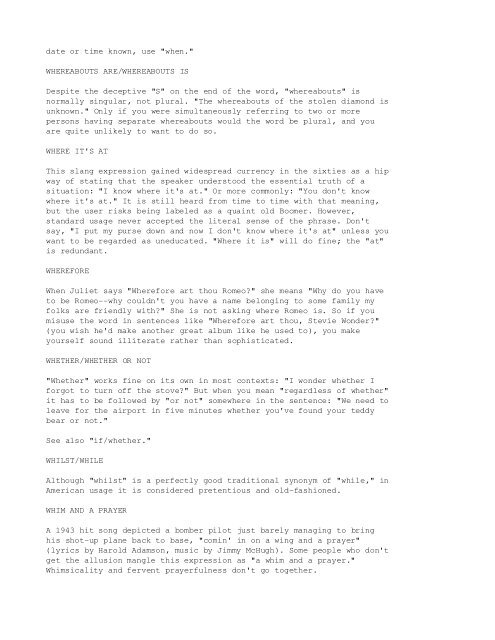Common_Errors_in_English_usage
Common_Errors_in_English_usage
Common_Errors_in_English_usage
You also want an ePaper? Increase the reach of your titles
YUMPU automatically turns print PDFs into web optimized ePapers that Google loves.
date or time known, use "when."<br />
WHEREABOUTS ARE/WHEREABOUTS IS<br />
Despite the deceptive "S" on the end of the word, "whereabouts" is<br />
normally s<strong>in</strong>gular, not plural. "The whereabouts of the stolen diamond is<br />
unknown." Only if you were simultaneously referr<strong>in</strong>g to two or more<br />
persons hav<strong>in</strong>g separate whereabouts would the word be plural, and you<br />
are quite unlikely to want to do so.<br />
WHERE IT'S AT<br />
This slang expression ga<strong>in</strong>ed widespread currency <strong>in</strong> the sixties as a hip<br />
way of stat<strong>in</strong>g that the speaker understood the essential truth of a<br />
situation: "I know where it's at." Or more commonly: "You don't know<br />
where it's at." It is still heard from time to time with that mean<strong>in</strong>g,<br />
but the user risks be<strong>in</strong>g labeled as a qua<strong>in</strong>t old Boomer. However,<br />
standard <strong>usage</strong> never accepted the literal sense of the phrase. Don't<br />
say, "I put my purse down and now I don't know where it's at" unless you<br />
want to be regarded as uneducated. "Where it is" will do f<strong>in</strong>e; the "at"<br />
is redundant.<br />
WHEREFORE<br />
When Juliet says "Wherefore art thou Romeo?" she means "Why do you have<br />
to be Romeowhy couldn't you have a name belong<strong>in</strong>g to some family my<br />
folks are friendly with?" She is not ask<strong>in</strong>g where Romeo is. So if you<br />
misuse the word <strong>in</strong> sentences like "Wherefore art thou, Stevie Wonder?"<br />
(you wish he'd make another great album like he used to), you make<br />
yourself sound illiterate rather than sophisticated.<br />
WHETHER/WHETHER OR NOT<br />
"Whether" works f<strong>in</strong>e on its own <strong>in</strong> most contexts: "I wonder whether I<br />
forgot to turn off the stove?" But when you mean "regardless of whether"<br />
it has to be followed by "or not" somewhere <strong>in</strong> the sentence: "We need to<br />
leave for the airport <strong>in</strong> five m<strong>in</strong>utes whether you've found your teddy<br />
bear or not."<br />
See also "if/whether."<br />
WHILST/WHILE<br />
Although "whilst" is a perfectly good traditional synonym of "while," <strong>in</strong><br />
American <strong>usage</strong> it is considered pretentious and oldfashioned.<br />
WHIM AND A PRAYER<br />
A 1943 hit song depicted a bomber pilot just barely manag<strong>in</strong>g to br<strong>in</strong>g<br />
his shotup plane back to base, "com<strong>in</strong>' <strong>in</strong> on a w<strong>in</strong>g and a prayer"<br />
(lyrics by Harold Adamson, music by Jimmy McHugh). Some people who don't<br />
get the allusion mangle this expression as "a whim and a prayer."<br />
Whimsicality and fervent prayerfulness don't go together.





